At first
For corporate labor management, dealing with mental health disorders in the workplace is an important issue that cannot be avoided.
In the event of a person with a disorder, the corresponding company is forced to put a lot of energy on it, and the various impacts on the company are very large, so it is taken up as an important issue in labor management.
From the perspective of labor management, there is a need to establish a system that can take appropriate measures such as preventive measures before mental health problems occur and the creation of rules when problems occur.
The role that company workers should play and the measures to be taken by companies
Industrial physicians, social insurance labor consultants (labor consultants) and lawyers are considered professionals involved in companies in the event of mental health disorders. The following is assumed to be a role to play in dealing with the unwell.
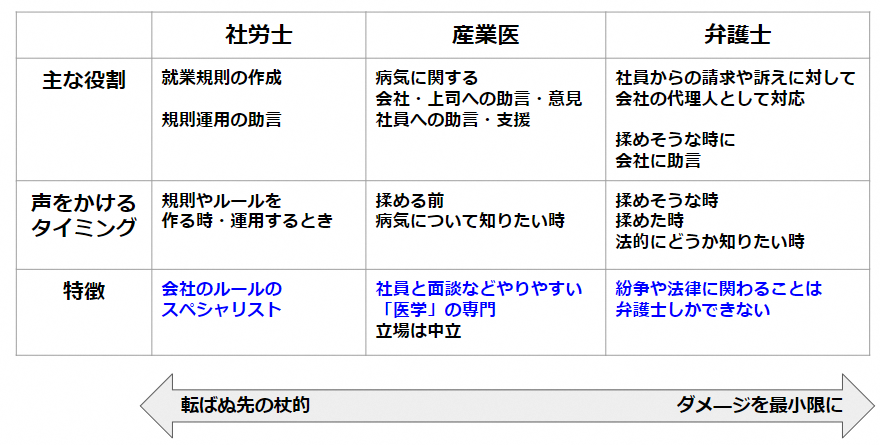
As a wand, companies need to take preventive measures for employees before mental health problems occur, and develop internal rules and rules when something goes wrong, and take measures and systems in advance as a company. I think that the role of supporting for that is called a company laborer.
Then, what kind of things should we pay special consideration to such rule development and system development?
The whole picture of the measures to be taken by the company from the viewpoint of the company workers
From the perspective of corporate labor management and the company workers who support it, the overall picture of the measures that companies should take as a response to mental health disorders is as follows.
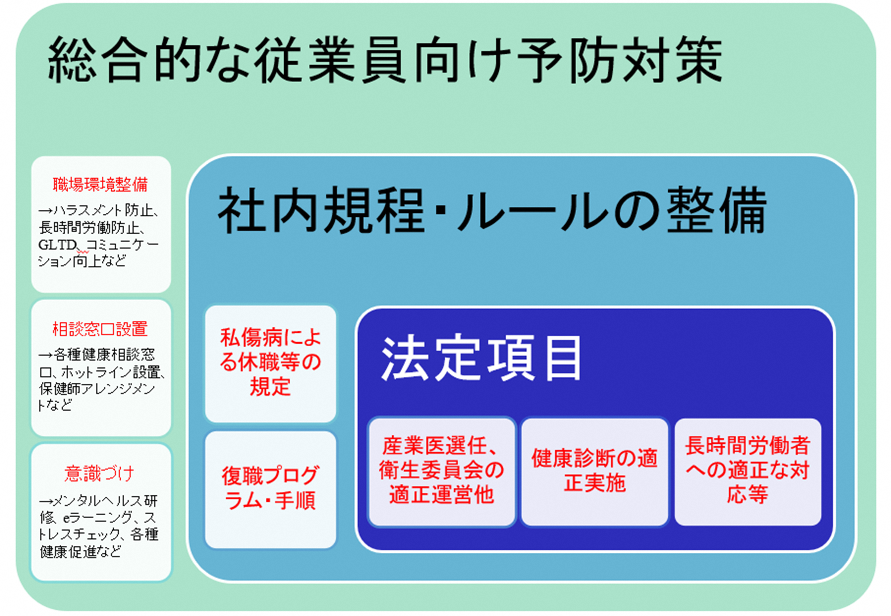
After this, I will explain each of these measures.
Confirmation of minimum legal items
Let's start by checking the minimum legal items.
(1) Appointment of industrial physicians, proper operation of the Health Committee, etc.
It is important to have a well-established hygiene management system according to the size of employees.
Workplaces that employ more than 50 people at all times are required to appoint industrial physicians and health managers, and to establish a health committee.
Is there an in-house hygiene management system in place? Is the Health Committee properly organized and operated? You will be asked to check, such as. In addition, workplaces that use 10 or more employees at all times also need to create a system and organization, including the appointment of a health promoter.
(2) Appropriate implementation of medical examinations
Regular implementation of health checkups required by laws and regulations is an obligation imposed on employers, so let's respond thoroughly.
In general, it is necessary to conduct a medical examination once a year. Employees engaged in work where late-night work occurs need to conduct a medical examination once every six months, but be careful because there are cases where implementation is missing.
In the unlikely event that these health examinations are not properly conducted, not only will employees be asked to receive guidance from institutions such as the Labor Standards Inspection Office and be required to correct them, but in the event of problems related to the health management of employees such as mental health disorders, companies may be deemed to have neglected health management and may be held accountable. Regarding health checkups, let's check the implementation status of the company and make improvements as necessary.
(3) Appropriate response to long-time workers
It is also necessary to respond appropriately to long-term workers.
In the unlikely event that overtime work of more than 80 hours per month occurs, it is necessary to ensure that the doctor engages in interview guidance and encourages them.
It is fair to say that long-time workers are one of the reserves of mental health disorders. As a company, it is necessary to properly grasp the status of working hours, including overtime and holiday work, and appropriately implement necessary measures such as encouraging interview guidance by doctors according to the status of working hours.
Establishment of internal rules and rules
As a measure to be taken by the company, the next important thing is the development of internal rules and rules. It is necessary to include and operate the following rules in the rules of employment and other internal personnel and labor-related regulations.
(1) Regulations of daily health management by the company
By establishing rules for daily health management by the company, it is possible to present the company's basic policy when problems arise in the health management of employees. First of all, if it is deemed necessary for health management, it is desirable to include in the regulations that it is not possible to refuse this without justifiable grounds, such as submitting a medical certificate from a doctor or ordering a medical examination by a doctor designated by the company, such as an interview.
In addition, it is important to rule the flow of having a medical certificate submitted if absent from work continues, and that interview guidance by a doctor can be conducted if the person is requested after the stress check is carried out.
(2) Provisions for taking leave of absence or returning to work due to personal injury or illness, including mental health disorders
Even if the company has routine health care, there can actually be mental health disorders. It is also important to design a leave of absence system in advance in order to appropriately deal with the problem and reduce troubles in case of a person who is unwell.
As a content, it is important to clarify the practical judgment criteria by examining who is eligible for the leave system, the reasons for leave of absence, the period during which employees can take leave, and how to calculate the number of days when there is an interruption during absence.
Next, it is necessary to establish rules for mental health disorders to take leave of absence and rules for returning to work or leaving work when the period of leave expires.
Regarding reinstatement, instead of receiving the intention of the person who wants to return because the disease has healed and recovered, the company will realize it only if the company takes the initiative to make a judgment that the reason for leave of absence has disappeared (healed). In this case, it is important to clarify in the rules of employment that "when you offer to return to work, you must submit a medical certificate from a doctor" and that the state of healing is "to restore the conventional work to a health condition that can be carried out as well as when you are healthy".
Furthermore, when determining whether or not the company can return to work, we would like to consider securing a means of obtaining judgment materials for returning to work by establishing a duty of cooperation of employees when the company asks for interviews and interviews with the attending physician, and the obligation to receive medical examinations by doctors designated by the company.
In addition, considering the possibility of recurrence depending on the situation afterwards even if you return to work, if you are absent from work or cannot provide normal labor within the same or similar reasons after returning to work, you will be asked to cancel your reinstatement and order a re-leave of absence, and in that case, it is necessary to clarify that the leave period will be the remaining period of leave that you have taken so far.
On the other hand, it is also important to stipulate that if the company determines that the reason for leave of absence has not disappeared (personal injury and illness as a reason for leave of absence has not healed), it will be retired (not dismissal). By clearly stating in the rules of employment that "if the reason for leave of absence has not disappeared at the end of the leave period expires," and confirming that both the unwell person and the company can lead to the prevention of trouble.
(3) Matters that companies should implement in anticipation of returning to work and after returning to work
In addition, it is important to formulate rules after returning to work in anticipation of employees returning to work after taking leave of absence.
Specific initiatives for returning to work are to formulate a support program for returning to work that sets out rules as a company, and a plan to support reinstatement based on the individual situation of returnees. As a result, it is possible to help realize a smooth return to work by having the person in question feel secure and sharing the contents of support and the status of return with the attending physician and industrial physician sequentially.
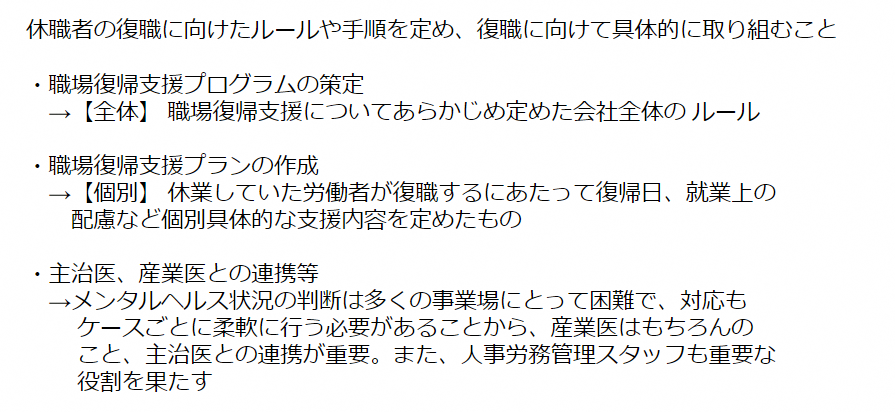
At last
I would like to reconfirm the points of response to mental health disorders in the workplace. Please feel free to contact FECC if you have any questions or concerns, as well as to help with mental health issues at each company.
- Check the required implementation items stipulated by laws and regulations and check again if your company is responding
- Let's help reduce the risk of preventing troubles by establishing internal rules and rules in anticipation of the occurrence of mental health disorders
- Regarding mental health measures and health management of employees, let's work on implementation as an important issue of labor management as a whole company
Fecc to consult on how to deal with employees who have mental illnesses
FECC helps hr and management solve labor and legal questions. It is also possible to consult with lawyers and company workers free of charge about the handling of employees who have mental disorders, such as leave of absence or dismissal. Please feel free to contact us!
Related article
The essence of mental health prevention and response that changes in corona
Mental health professionals who are industrial physicians and psychiatrists but also serve as directors of startup companies will tell you how to prevent mental disorders and tips for early detection of mental disorders.
Related article
How to respond to employees with mental disorders learned from legal precedents
I got into a big trouble because I laid off an employee who couldn't come to the company due to mental disorders. FECC lawyers will explain the handling of leave of absence and dismissal of employees who have had mental disorders in an easy-to-understand manner according to the model case, referring to actual precedents.

 Consult and make a reservation
Consult and make a reservation Add LINE Friends
Add LINE Friends 080-1001-4675
080-1001-4675
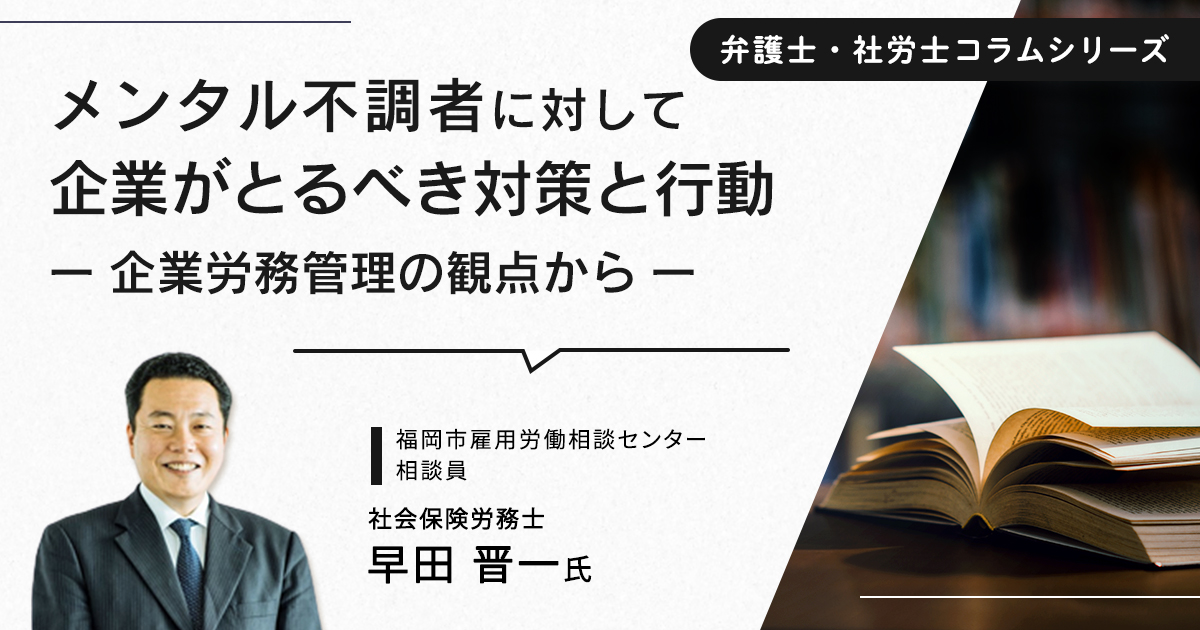


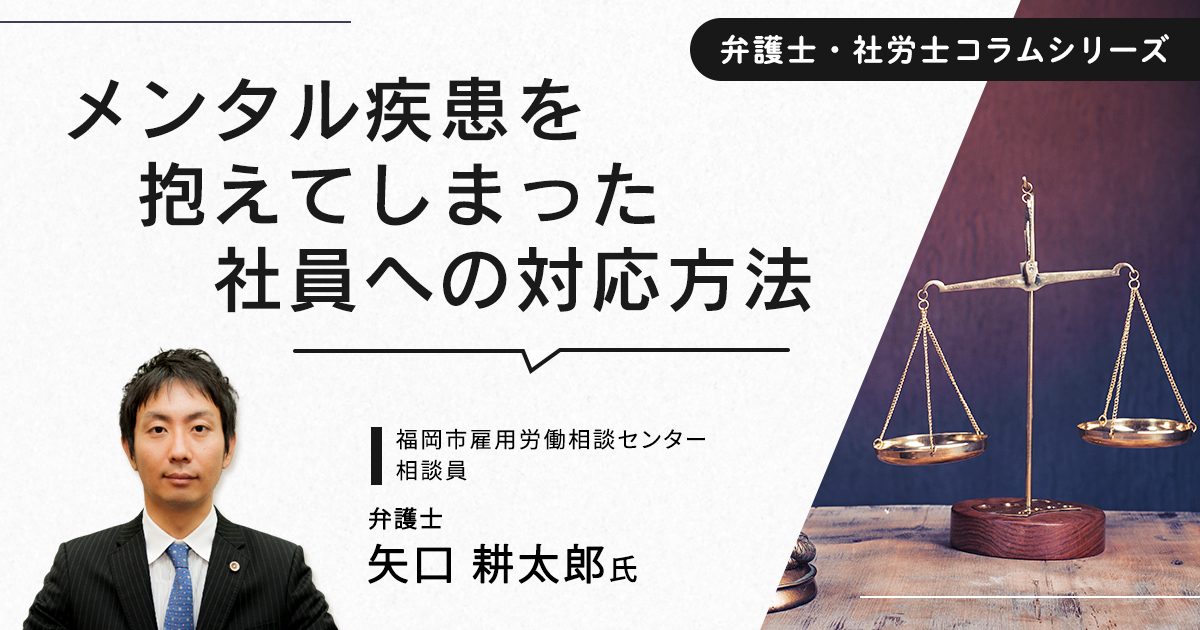

 Receive on FaceBook
Receive on FaceBook Receive on LINE
Receive on LINE
